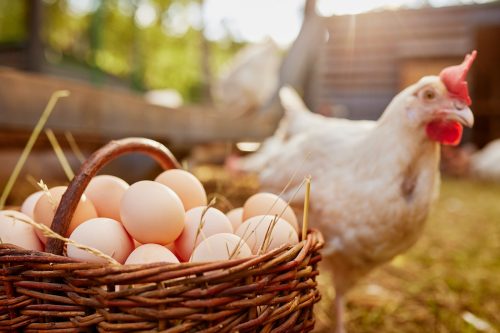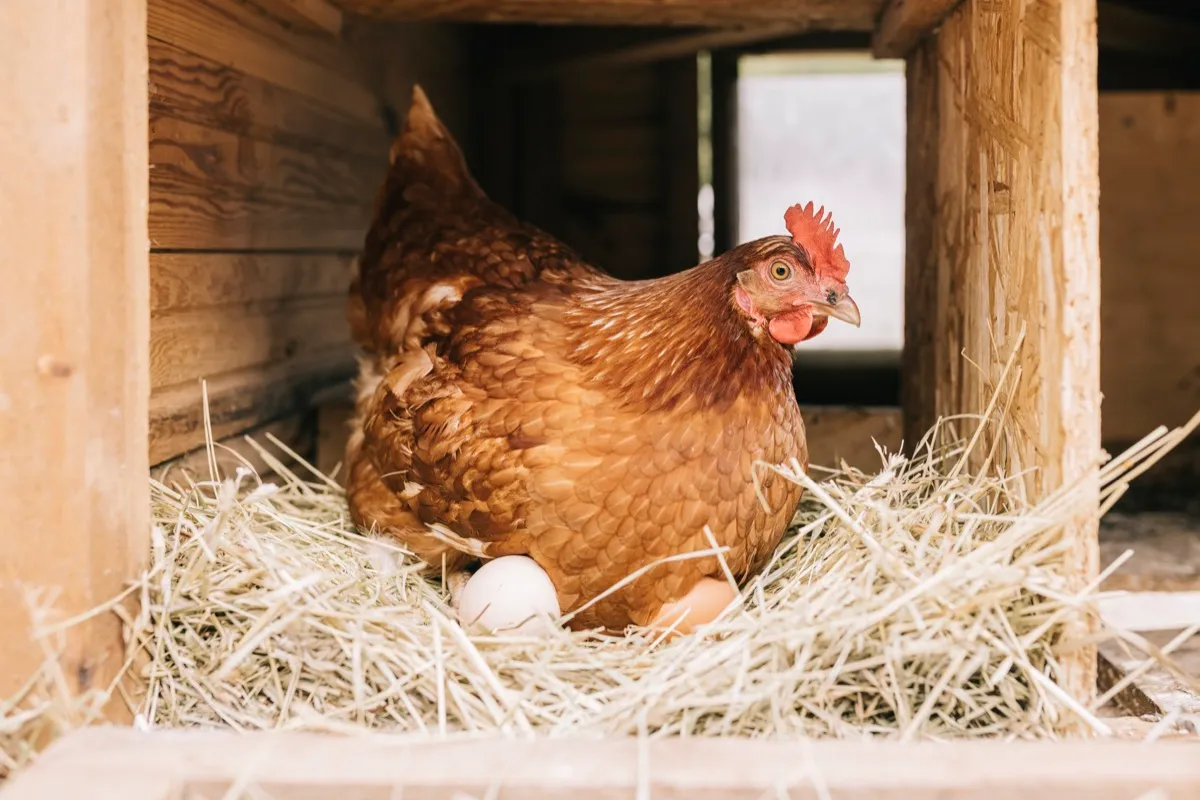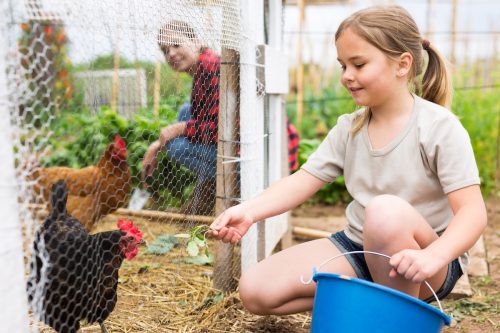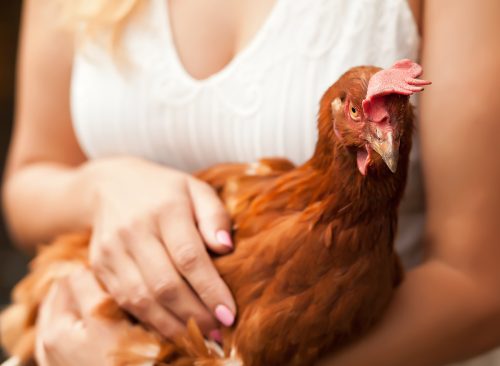The Dos and Don’ts of Raising Backyard Chickens, According to Experts

Raising backyard chickens can sound daunting—but once you’ve completed your research and gotten your bearings, it’s one of the most rewarding experiences you can have as a homeowner. Chickens provide fresh eggs, natural pest control, and companionship; not to mention, keeping them in your yard can spruce the place up with clucking and cuddles (yes, many chickens love a snuggle!). But because chickens are living creatures, it’s important to go into the project knowing exactly what’s required to keep them happy and healthy. Ahead, we asked experts for their best backyard chicken tips.
RELATED: 6 Plants That Keep Deer Out of Your Yard, According to Experts.
Benefits of raising backyard chickens

Fresh eggs
Hens typically lay about one egg a day, and these eggs are one of the top benefits of housing backyard chickens.
“I use the eggs for everything—breakfast, cakes, and French toast,” says Andy Ellis, longtime chicken owner and managing director of Posh.co.uk. “I even give the excess to my neighbors when they need some.”
Coop-fresh eggs typically have a better nutritional profile than store-bought ones, too. They contain higher levels of omega-3 fatty acids and lower levels of cholesterol and saturated fats; you can store them in the fridge for up to a month.
Connection to your food sources
If you’re new to growing your own food—or even if you’ve simply kept to fruits, vegetables, and herbs in the past—raising chickens can be a breakthrough experience with regard to learning about food processes.
“Beyond fresh eggs, the top benefit is fostering a deeper connection to food sources and nature,” says Corrie Duffy, the chef behind the food blog Corrie Cooks. It can even inspire kids to learn more about food if that’s a goal of yours.
Natural pest control
Your new chickens will also help with pest control. “I’ve known people who have invested in a small flock exclusively for the purpose of reducing pests in their backyard,” says Brett Bennett, director of operations at PURCOR Pest Solutions.
“Chickens eat tons of bugs, from flies and mosquitoes to ticks and more—they’ll even eat mice—which can help protect your garden plants from pests and also just make your yard a more pleasant place to spend time,” he notes.
Natural fertilizer
Chickens can even promote soil health in your yard. “The animals are constantly producing an excellent, nitrogen-rich fertilizer through their feces,” says Ryan Farley, CEO of LawnStarter. “Chicken poop is also rich in other great nutrients like phosphorus and potassium.”
The birds will naturally dig through compost heaps and will often leave droppings there.
“Many people I see with backyard chickens end up recycling lots of their waste right back into the yard and end up with gorgeous, lush gardens as a result,” Farley adds.
Therapeutic companionship
You might not put chickens in the same category as household cats or dogs, but they can provide many similar therapeutic benefits.
“Chickens have unique personalities and rely on routine,” Patrick Biggs, PhD, a flock nutritionist for Purina Animal Nutrition, told the brand. “This makes it easy for caretakers to develop a bond with their birds. A flock of backyard chickens can make good therapy animals because they are calming to watch, relatively easy to care for and deliver daily rewards in the form of farm fresh eggs.”
RELATED: 5 Things in Your Garden That Are Poisonous to Your Dog.
Things to consider before starting a chicken coop

Cost
Like any pet, there are certain costs you’ll encounter with chickens. First, there is the cost of the coop and the attached chicken run.
“A small and basic coop will cost at least $500, and then you’ll need to add nesting boxes and little hiding spots for them,” says Ellis. “Bigger and nicer coops can cost upwards of $2,000—and these are surprisingly worth it.” (The size of the coop will depend on the size of your flock; more on that later!)
Next, there’s monthly upkeep. “Food is around $300 per year, bedding and supplies are often around $150 per year, and then wormer and other important health products are going to be at least another $100 each year,” says Ellis. “Then, you need to factor in any unexpected health conditions that might crop up and require veterinary attention.”
Many chicken owners estimate they spend between $50 and $100 per month maintaining their flock.
Space
Your chickens will require both coop space and run space. The coop is the house-like structure where your chickens will lay their eggs and sleep at night; the run is a fenced-in space connected to the coop where the chickens can spend their days.
The amount of space per chicken in each space can vary slightly depending on the amount of space in the other. For example, if you have a large run, you can have a smaller coop, and vice versa.
However, the experts at the University of Georgia say most breeds of chickens should have at least three square feet of space in the coop per chicken and about four square feet of run space per chicken. If there’s no run space, aim for between eight and 10 square feet of coop space.
Health and safety
We’ll explain how to create a safe environment for your chickens below, but first, you need to know some important health and sanitation techniques when collecting eggs. According to Ellis, you’ll want to collect your eggs daily to avoid rotten eggs or contamination.
When you go in the coop, wear designated footwear to prevent the spread of disease, and always wash your hands thoroughly after handling the chickens or cleaning their coop.
You should clean the coop regularly and freshen up your chickens’ bedding weekly.
Lastly, never share equipment with other chicken or bird owners—it could introduce new and potentially harmful bacteria or viruses.
What breed of chicken you want
If you’re keeping hens for eggs, there are a few breeds to consider, and the one you choose will depend on where you live and your climate.
If you live somewhere cool, consider breeds like the Brahma, Chantecler, Australorps, Barred Rocks, Cochins, Wyandottes, or Buff Orpingtons, according to the Farmer’s Almanac. If you live somewhere warm and humid, research Phoenixes, Minorcas, Andalusians, Leghorns, or Penedescencas.
You should also consider each breed’s level of egg production and personality (some birds are friendlier than others!).
How many chickens you should keep
Chickens like to socialize, so you’ll want to start your flock with at least two birds, though three is preferable. You can decide to add additional birds depending on your space or the number of eggs you’d like to yield.
What chickens eat
If chickens are allowed to roam, they can find a lot of food on their own, including plants, insects, and seeds. In the colder months or if your yard lacks space, you should give them pallet or crumble chicken feed. Treats can include berries, corn, leafy greens, and fruits.
RELATED: How to Compost: A Step-by-Step Guide.
How to keep chickens in your backyard

Check your local laws.
You don’t want to break the law by accident! Some cities and towns place limitations on starting your own chicken flock, including how many chickens you’re allowed to keep or whether or not you can own both hens and roosters or just hens. It’s better to know the facts before you invest in any materials.
Construct (or purchase) your coop.
Your chicken coop’s primary purpose is to keep your flock safe from dangers like predators, rain, wind, heat, cold, and disease.
It’ll need nesting boxes (these should be easily accessible from the outside of your coop so you can collect your eggs), roosting bars, and vents for circulation. You can build your coop yourself, or there are many options available for purchase.
Create a run.
This is where your chickens will get their exercise. It’ll need to be adequately enclosed with wire fencing to keep chickens safe from predators. Ensure the fencing goes into the ground at least a foot to deter animals that can dig.
Most chicken owners also keep their feeders and waterers in the coop (the chickens typically won’t eat after they go to roost a few minutes before dusk, so they’ll be able to access this during the day when they most need it).
Provide daily food and water.
You should ensure your chickens have fresh drinking water each day. You can also feed them every day or use a large-scale feeder that can serve food for multiple days without refilling.
Keep your coop clean.
A dirty coop increases your chickens’ risk of infection. Each week, you’ll want to scoop up droppings and put down fresh bedding. At least twice a year, you should do a deep cleaning.
For these, remove the bedding and any coop accessories like feeders and perches. Spray down the coop with a hose and disinfect it with a natural cleaner like vinegar and water. Let everything air dry, and then bring the accessories back in, along with fresh bedding.
Collect your eggs.
Most hens will lay their eggs by mid-morning, and you should collect them as soon as possible. “The longer the egg is allowed to stay in the nest, the more likely the egg will get dirty, broken, or lose interior quality,” writes Penn State.
Put them directly in plastic-coated wire baskets or plastic egg flats and wash the eggs at a warm temperature as soon as you get to the sink. Dry them and cool them right after.
Protect your plants
Now that your chickens are off to a good start, you’ll want to secure the rest of your yard.
“Chickens can absolutely destroy your plants if they are able to access them, so unless you find a way to prevent your chickens from reaching your plants, you may be looking at a failed harvest or torn-up flowers,” says Jeremy Yamaguchi, CEO of Lawn Love. “Chicken wire or some kind of fencing is going to be the best way to keep them away.”
RELATED: 5 Easy Fruit Trees You Can Plant in Your Backyard.
Are backyard chickens worth it?

That depends on your priorities! From a monetary perspective, consider that chickens will typically cost between $50 and $100. If you typically purchase farm-stand eggs for $10 a dozen, you may reach that level quickly, especially if you’re big on eggs.
However, not everything can be monetized. You’ll also want to note how much effort you’re willing to put into your chickens and how rewarding that is for you. The answer will be different for everyone!
Conclusion
Owning backyard chickens requires lots of research, from knowing if you have the budget and space that’s necessary for them to keep their coop clean and safe. If you’re up for the challenge, it can be highly rewarding, and you’ll reap the benefits of fresh eggs, pest control, and companionship. For more backyard advice, visit Best Life again soon.